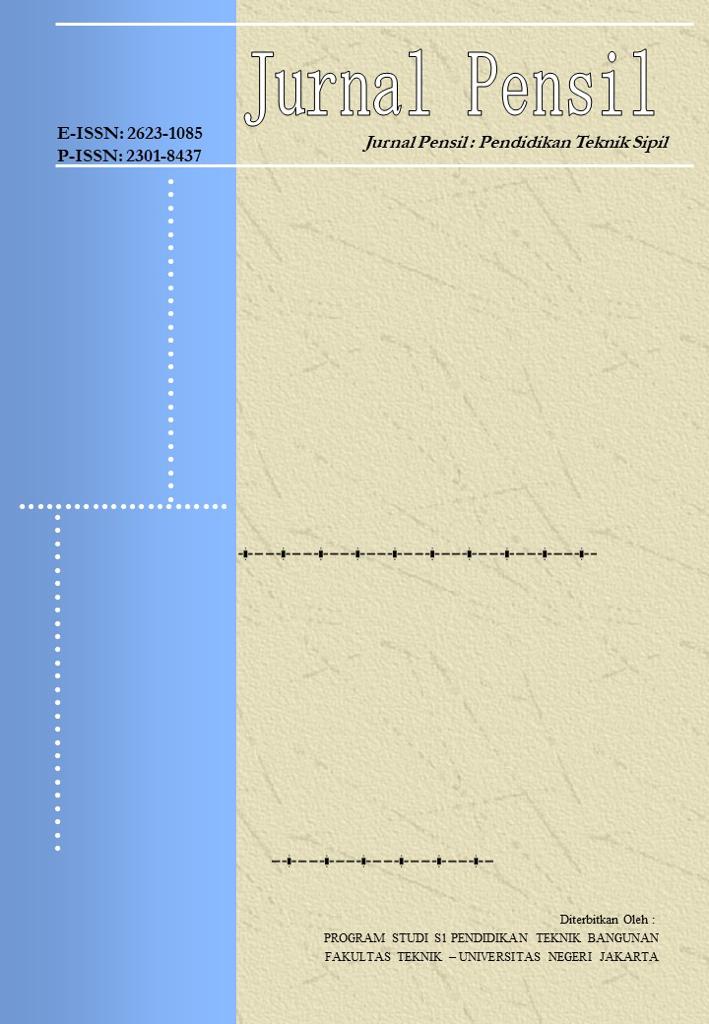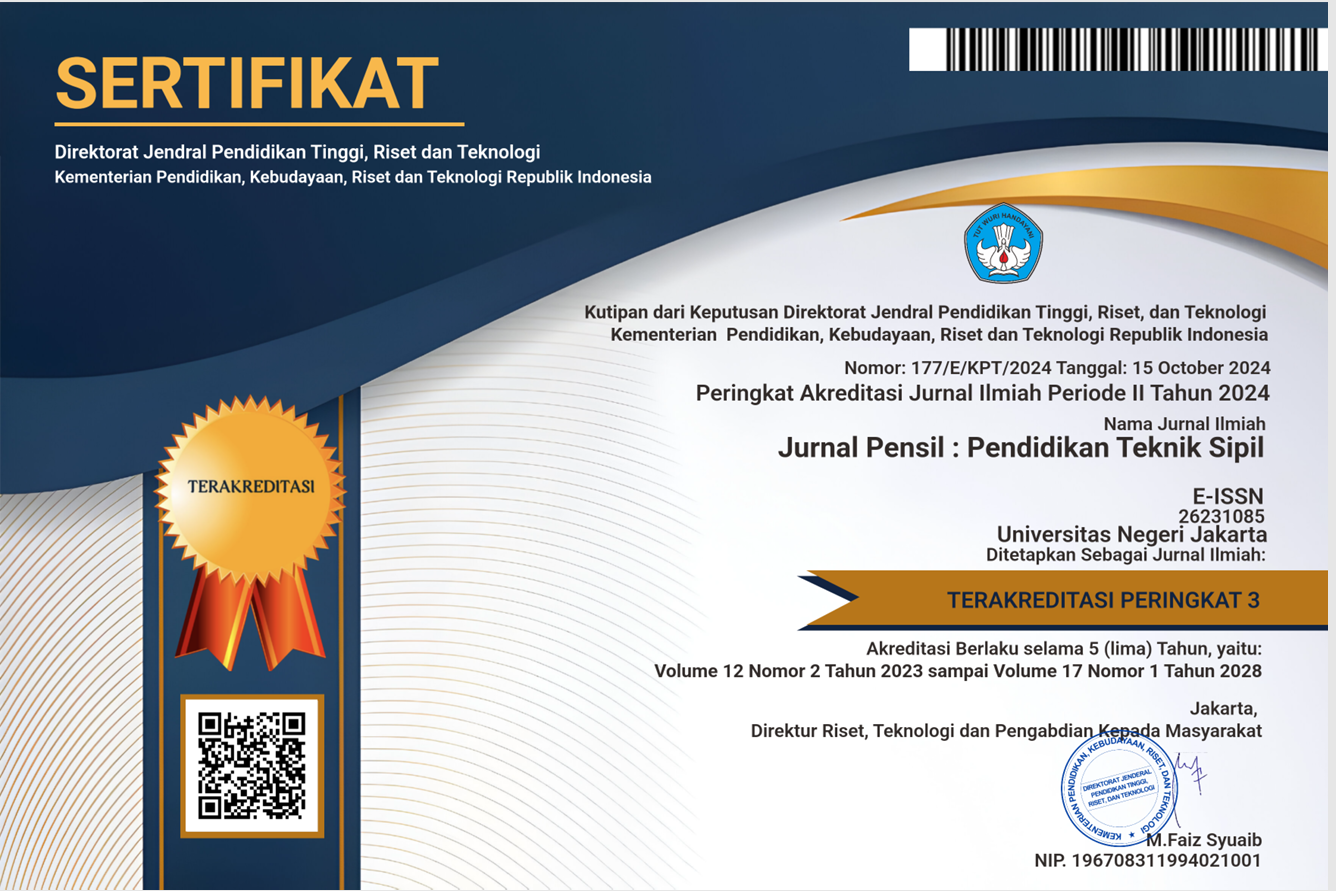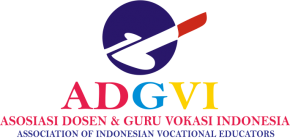A FRAMEWORK FOR SUCCESSFUL PROVISION OF SUSTAINABLE INFRASTRUCTURE WITH A PPP SCHEME IN INDONESIA
Keywords:
Success Criteria, Sustainable Infrastructure, PPP SchemeAbstract
In the development of infrastructure projects with the PPP scheme, the government needs a way to assess the level of success and sustainability of related projects. This study will identify criteria that can be used to assess the success provision of sustainable infrastructure under the PPP scheme in Indonesia. After that, these criteria are arranged in a framework that will be tested against an infrastructure project. Analytic Network Proces (ANP) method is used to determine the ranking of each criterion so that a new development framework can be made and used in Indonesia. In this study, a questionnaire was developed which was distributed to four (4) experts in the field of infrastructure development in Indonesia. The results obtained are the framework for the success of providing sustainable infrastructure with the PPP scheme in Indonesia consists of 6 (six) success criteria with the percentage of involvement, which are Financial and Economy (30,47%), Law and Political (10,63%), Health Safety and Environmental (12,18%), Managerial and Technic (14,58%), Operational and Maintenance (16,70%), and Social and Stakeholder (15,44%). The six (6) success criteria are composed of twenty (20) derived sub-criteria. The PLTU Batang project which was chosen as the object of validation in this study did not meet 6 sub-criteria of the existing 20 sub-criteria. With this development framework, it can be taken into account in making decisions to determine the success of sustainable infrastructure projects with PPP schemes in Indonesia
References
Ascarya. (2005). Analytic Network Process (ANP) Pendekatan Baru Studi Kualitatif. Universitas Trisakti.
Bhimasena. (2019). Laporan Program Tanggung Jawab Sosial 2019.
Chou, J. S., & Pramudawardhani, D. (2015). Cross-country comparisons of key drivers, critical success factors and risk allocation for public-private partnership projects. International Journal of Project Management, 33(5), 1136–1150. https://doi.org/10.1016/j.ijproman.2014.12.003
Chourasia, A. S., Dalei, N. N., & Jha, K. (2021). Critical success factors for development of public-private-partnership airports in India. Journal of Infrastructure, Policy and Development, 5(1), 1–21. https://doi.org/10.24294/jipd.v5i1.1259
Dolla, T., & Laishram, B. (2020). Enhancing Sustainability in Public-Private Partnership Projects through Bid Selection Model. Transportation Research Procedia, 48, 3896–3907. https://doi.org/10.1016/j.trpro.2020.08.031
Hansen, S., Too, E., & Le, T. (2019). Criteria to consider in selecting and prioritizing infrastructure projects. MATEC Web of Conferences, 270, 06004. https://doi.org/10.1051/matecconf/201927006004
Haque, M. N., Saroar, M., Fattah, M. A., & Morshed, S. R. (2020). Public-Private Partnership for achieving sustainable development goals: a case study of Khulna, Bangladesh. Public Administration and Policy, 23(3), 283–298. https://doi.org/10.1108/PAP-04-2020-0023
Hashim, H., Che-Ani, A. I., & Ismail, K. (2017). Public Private Partnership (PPP) project performance in Malaysia: Identification of issues and challenges. International Journal of Supply Chain Management, 6(2), 265–275.
He, N., Li, Y., Li, H., Liu, Z., & Zhang, C. (2020). Critical factors to achieve sustainability of public-private partnership projects in the water sector: A stakeholder-oriented network perspective. Complexity, 2020. https://doi.org/10.1155/2020/8895980
Hope, A. J., Rose, J., & Geoff, O. (2012). The PFI Sustainability Evaluation Tool: A Methodology for Evaluating of Sustainability within PFI Housing Projects. SSRN Electronic Journal, July. https://doi.org/10.2139/ssrn.2129130
Hu, Q. (2020). Study on the key factors of the sustainable development of environmental protection PPP projects in China. IOP Conference Series: Earth and Environmental Science, 531(1). https://doi.org/10.1088/1755-1315/531/1/012014
Ismail, K., Khaderi, S. S., Qusoiri, S. A., Karim, S. A., Talib, Y. A., & Salleh, N. A. (2019). An analysis of sustainability implementation in Malaysian Private Finance Initiative (PFI) Projects: Issues, challenges and way forward. International Journal of Supply Chain Management, 8(3), 665–670.
Kavishe, N., Jefferson, I., & Chileshe, N. (2018). An analysis of the delivery challenges influencing public-private partnership in housing projects: The case of Tanzania. In Engineering, Construction and Architectural Management (Vol. 25, Issue 2). https://doi.org/10.1108/ECAM-12-2016-0261
Kemenkeu. (2016). Mengenal Kerjasama Pemerintah dengan Badan Usaha (KPBU), Skema Public Private Partnership (PPP) di Indonesia. Kemenkeu.
Kościelniak, H., & Górka, A. (2016). Green Cities PPP as a Method of Financing Sustainable Urban Development. Transportation Research Procedia, 16(March), 227–235. https://doi.org/10.1016/j.trpro.2016.11.022
KPPIP. (2022). PSN PLTU Batang Terapkan Teknologi Ultra Super Critical Untuk Tekan Pengurangan Emisi. KPPIP.
Kristiawan, F., Rohman, M. A., & Machsus. (2020). A framework to assess success criteria performance of public private partnership (PPP) toll road projects in Indonesia. IOP Conference Series: Materials Science and Engineering, 930(1). https://doi.org/10.1088/1757-899X/930/1/012004
Kutnadi. (2020). Aktivitas Proyek PLTU Batang Direkoendasikan Dihentikan Sementara Dampak COVID-19. Antaranews.
Lestari, S. (2015). Masih Ada Masalah Lahan Presuden Jokowi Resmikan PLTU Batang. BBC News.
Leviakangas, Pekka; Ye, Yanbing; Olatunji, O. A. (2018). Sustainable public–private partnerships: Balancing the multi-actor ecosystem and societal requirements. Frontiers of Engineering Management, 0(0), 0. https://doi.org/10.15302/j-fem-2018020
Li, H., Xia, Q., Wen, S., Wang, L., & Lv, L. (2019). Identifying Factors Affecting the Sustainability of Water Environment Treatment Public-Private Partnership Projects. Advances in Civil Engineering, 2019. https://doi.org/10.1155/2019/7907234
Medianti, B. S. (2022). Mewujudkan Infrastruktur Berkelanjutan: Aspek, Pembiayaan dan Manfaat. KPBU Kemenkeu.
Mingo, W. (2020). Strategies for Identifying and Managing Public-Private Partnerships’Critical Success Factors. 42–165.
Ogunsanmi, O. (2013). Stakeholders’ perception of key performance indicators (KPIs) of Public-Private Partnership (PPP) projects. International Journal of Construction Supply Chain Management, 3(2), 27–38. https://doi.org/10.14424/ijcscm302013-27-38
Osei-Kyei, R., & Chan, A. P. C. (2018). A best practice framework for public-private partnership implementation for construction projects in developing countries: A case of Ghana. Benchmarking, 25(8), 2806–2827. https://doi.org/10.1108/BIJ-05-2017-0105
PerPres. (2015). Peraturan Presiden Republik Indonesia Nomor 38 Tahun 2015 Tentang Kerjasama Pemerintah dengan Badan Usaha Dalam Penyediaan Infrastruktur.
Pramanik, R. A., Purnomo, E. P., & Kasiwi, A. N. (2020). Dampak perizinan pembangunan pltu batang bagi kemajuan perekonomian masyarakat serta pada kerusakan lingkungan. Jurnal Ekonomi Dan Manajemen, 17(2), 248–256.
Priambudhi, D. (2019). Aplikasi Value Enginering Untuk Optimalisasi Pembiayaan Pada Proyek Pembangunan Gedung Kuliah II UIN Suska Riau. In Jurnal Ekonomi Volume 18, Nomor 1 Maret201.
Priyarsono, D. S., Rizal, R. M., & Pertanian Bogor, I. (2019). The Success Factors of Public Private Partnership Implementation for Infrastructures Development: New Evidence from the Indonesian Experience. 366(Icispe 2018), 64–67.
Rostiyanti, S. F., & Pangeran, M. H. U. (2018). Framework for Risk Allocation in Ppp Infrastructure Development. Researchgate.Net, December.
Saaty, Thomas L; Vargas, L. G. (2006). Decision Making With the Analytic Network Process. Springer Science. https://doi.org/saaty
Schwab, K. (2018). The Global Competitiveness Report. In World Economic Forum.
Syukra, R. (2021). Penerapan Teknologi USC pada PLTU Bisa Turunkan Emisi Gas. Investor.
Talib, Y. A., Ismail, K., Salleh, N. A., & Karim, S. A. Q. S. A. (2018). Sustainability in PFI project: Concept and perception of the stakeholders. AIP Conference Proceedings, 2020(October 2018). https://doi.org/10.1063/1.5062694
Umah, A. (2021). Mundur Gegara COVID. PLTU Batang Beroperasi Paling Telat 2022. CNBC Indonesia.
UN. (2015). No Title. Transforming Our World; the 2030 Agenda for Sustainable Development.
Villalba-Romero, F., & Liyanage, C. (2016). Evaluating Success in PPP Road Projects in Europe: A Comparison of Performance Measurement Approaches. Transportation Research Procedia, 14, 372–381. https://doi.org/10.1016/j.trpro.2016.05.089
Wang, N., & Ma, M. (2021). Public–private partnership as a tool for sustainable development – What literatures say? Sustainable Development, 29(1), 243–258. https://doi.org/10.1002/sd.2127
World Economic Forum. (2020). Global Future Council on Infrastructure Six Qualities of Sustainable Infrastructure. June.
Zhou, L., Keivani, R., & Kurul, E. (2013). Sustainability performance measurement framework for PFI projects in the UK. Journal of Financial Management of Property and Construction, 18(3), 232–250. https://doi.org/10.1108/JFMPC-08-2012-0032











.png)
.png)
1.png)

